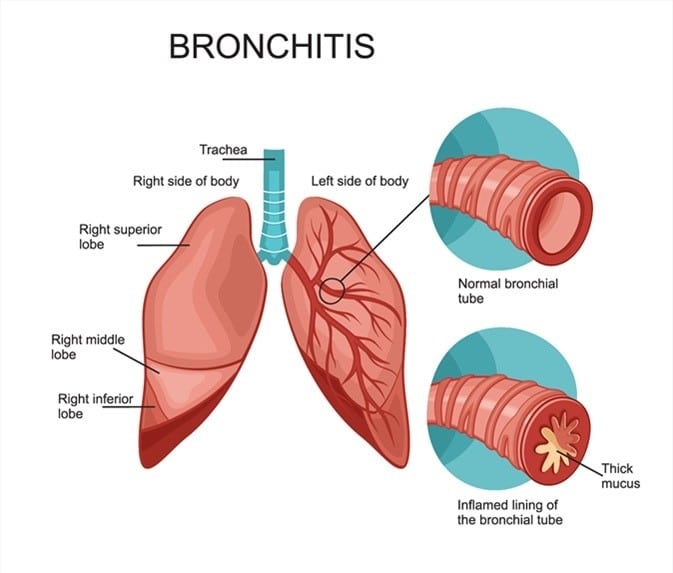The Best Guide to Bronchitis Medications That Will Help You Choose Wisely
Bronchitis Medication Consumer Guide

There’s an old adage about head colds: two days coming, two days here, two days going.
But for sufferers of bronchitis, that couldn't’be further from the truth.
That’s because just when you expect your head cold to disappear, you wake up and your voice is froggy. Your chest feels heavy. You are coughing up mucus.
It may be difficult to breathe.
These are all signs of acute bronchitis. A condition that occurs when virus or bacteria causes an infection in the bronchial tubes that branch out into your lungs.
Acute #bronchitis is a condition that occurs when virus or bacteria causes an #infection in the #BronchialTubes that branch out into your #lungs. Click To Tweet
The condition is painful, alarming and long-lasting. The average bronchitis patient has it for 18 days.
With this guide to bronchitis medications, you’ll see bronchitis through a medical lens, and learn everything there is to know about how it’s diagnosed and treated.
The Symptom Relief Remedy List
See below a list of medications used to treat bronchitis symptoms:
- Drink water: natural; to thin mucus
- Albuterol: prescription; steroid inhaler
- Guaifenesin: OTC; an accelerant that reduces mucus
- Oxygen: prescription; sometimes required in severe cases
- Cayenne pepper and spicy foods: natural; to thin mucus
- Allergy medications: OTC; for allergy sufferers who have bronchitis
- Humidifiers: natural; add moisture to the air, helpful at night for better sleep
- Steam treatments: natural; vapors that help loosen mucus from bronchial tubes
- Antibiotics: prescription; this includes Z-packs, Augmentin, and Amoxicillin amongst other medications
Always consult with a doctor before choosing a remedy.
Diagnosing Bronchitis
There are two types of bronchitis: acute and chronic.
Acute bronchitis often occurs after a cold. Even if the virus itself doesn’t move into your bronchial tubes, getting sick leaves them susceptible to bacteria. One or the other will cause acute bronchitis.
Chronic bronchitis is typically seen in smokers. This refers to the kind of bronchitis that results from the lung damage of heavy, long-term smoking. It usually occurs in middle-aged or older patients and can be a precursor to other illnesses like COPD.
Causes of Bronchitis
Bronchitis can be caused by smoke, first or second-hand, and other lung irritants like poor air quality, chemicals or even dust.
Often times, it’s just caused by a virus and the condition of your lungs and immune system can determine if you are susceptible to bronchitis.
Avoiding Bronchitis
Bronchitis is viral or bacterial. Avoiding bronchitis means engaging in activities that support your immune system. This could mean getting healthy, paying attention to what you eat and exercising.
Also, washing your hands regularly and avoiding germs will help you steer clear of bronchitis.
Don’t smoke to reduce the risk of catching bronchitis and other illnesses. If you have to be around pollutants that are harmful to your lungs, it’s a good idea to wear a mask.
Getting the flu vaccine can help people avoid viral bronchitis strains that tag along with the flu.
Symptoms of Bronchitis
The following symptoms could mean you have bronchitis and should warrant a trip to the doctor:
- Wheezing: or whistling when breathing
- A cough: with mucus that could be clear, yellow or green
- Chest congestion: that makes your chest feel pressured or full
- Shortness of breath: characterized by feeling like you can’t breathe well
These are the most characteristic signs of bronchitis. Some sufferers report being overly tired and achy, running a low fever or experiencing cold symptoms like a runny nose or a sore throat.
This could be because viral bronchitis usually accompanies a cold or another virus.
Diagnosis
Diagnosing bronchitis requires a visit to the doctor. Usually, they will take inventory of your symptoms and listen to your lungs to determine if you have bronchitis.
In some cases, a chest x-ray may be required to rule out pneumonia, a different kind of lung infection that occurs when mucus pools outside the bronchial tubes in the lung itself.
When to Worry?
If you have the symptoms above, it’s possible you have bronchitis and might want to see the doctor.
Definitely, don’t hesitate to call if you experience any of the following:
- Weight loss
- Trouble speaking
- Blood-tinged mucus
- Inability to get restful sleep
- Chest pains accompanying illness
- Coughing for more than a few weeks
Once doctors have determined the cause of your illness, bronchitis treatment is prescribed.
Bronchitis Medications: Rx

Most often doctors prescribe an antibiotic medication and, in some cases, a steroid inhaler.
This practice is controversial due to the increased chance for antibiotic drug resistance, which will be discussed in more depth below.
Sadly, viral bronchitis can’t be treated with antibiotics or other drugs. It simply has to run its course during which time symptom-relief bronchitis drugs are important for sufferers.
As it turns out, most cases of bronchitis are viral, not bacterial.
If doctors know this then why prescribe antibiotics at all?
Doctors prescribe antibiotics because it’s helpful in preventing secondary bacterial infections in the lungs.
The last thing you want when you’re suffering from bronchitis is to get pneumonia also. And if it turns out you have a rare instance of bacterial bronchitis it will treat that too.
Common antibiotics prescribed for bronchitis treatment include:
The steroid inhaler, Albuterol, is the same they would prescribe for asthma. The goal of the medicine is to help your lungs perform better for optimal breathing.
Antibiotic Drug Resistance
Because antibiotics have not shown a consistent benefit to sufferers of bronchitis, users must be cautious of antibiotic drug resistance.
This occurs when harmful bacteria evolve and find new ways to attack your system. When this occurs antibiotics become less effective and can be rendered useless.
This is problematic for a couple of reasons. For one, resistant bacteria tend to last longer and make you sicker. Also, these resistant strains can spread to other people making it a public health concern.
Here's the top 25 most popular #medication used to treat #Bronchitis, ranked by #patient popularity and includes the lowest #DrugPrices for cost comparison. #Asthma #Bronchitis #Pneumonia #Cough Click To Tweet
Top 25 Most Popular Drugs Used to Treat Bronchitis
The bronchitis drugs listed below are arranged by patient popularity, #1 being the most popular.
For your convenience we have linked to all prescription drug prices (shown below) within our database so you can quickly compare and find the lowest prices on most popular bronchitis medicines.
- Azithromycin
-
Mucinex
- Hyclate Doxycycline
- Augmentin
- Amoxicillin
- Levaquin
- Zithromax
-
Guaifenesin
- Levofloxacin
- Amoxil
- Clarithromycin
- Amoxicillin Potassium Clavulanate
- Qvar
- Avelox
- Ciprofloxacin
-
Cefdinir
- Cipro
- Bactrim
- Biaxin
- Bactrim DS
- Cefuroxime
- Sulfamethoxazole Trimethoprim
- Ceftin
- Vibramycin
- Moxifloxacin
OTC Symptom Relief
Below is a list of over-the-counter remedies that provide some symptom relief to sufferers of bronchitis:
- Mucinex, Mucinex for Kids or Guaifenesin
- Claritin
A commonly sought after OTC expectorant for symptom relief is Mucinex, which goes by the generic name guaifenesin and comes in a number of brands.
Mucinex will loosen congestion in the chest to help you expel it through coughing and spitting. Doctors advise against using any cough suppressants, so make sure your version of guaifenesin does not have a cough suppressant component.
While not directly related to bronchitis treatment, Claritin can help people who suffer from bronchitis if they also suffer from allergies.
If you have untreated allergies and experience post nasal drip this can make worse symptoms of bronchitis. Clearing up your allergies really helps in terms of symptom relief.
Natural Symptom Relief
When it comes to #Bronchitis, natural symptom relief is no replacement for following a doctor's orders. But there are some #NaturalRemedies that may prove useful: #HomeRemedies #Asthma #Bronchitis #Pneumonia #Cough Click To Tweet
Some people would prefer natural symptom relief. When it comes to bronchitis, natural symptom relief is no replacement for following a doctor’s orders. But there are some natural remedies that may prove useful:
Rest Up
As always, when you’re sick it’s advisable to get lots of rest. Reducing stress levels and staying off of your feet will help decrease the risk of it getting worse or spreading to others.
Avoid Dairy
Milk and milk products contain ingredients that stimulate mucus production. So when you’re treating bronchitis symptoms it’s a good thing to avoid.
Humidifiers

Using a humidifier while you sleep could make for an easier night’s rest. Humidifiers infuse moisture into the air you breathe, making it easier to do when you are sick.
Eat Spicy Food
Have you ever eaten something spicy and thought, “Wow! That just cleared my sinuses!”
Adding cayenne pepper to a food or natural remedy is one way to thin mucus for symptom relief.
Steam Treatment
This occurs when a bronchitis patient breathes in steam. Adding essential oils like pine, tea tree or eucalyptus can help offer the same type of relief as a vapor rub. The intent is to breath easier by breaking up congestion with water vapor.
Drink Water Instead
Water helps thin mucus. It’s recommended that sufferers of bronchitis drink 8-12 glasses of water a day.
Natural remedies can help reduce the pain and bad feelings associated with having bronchitis with less medication.
Conclusion
Most cases of bronchitis must run their course. But if you’ve ever had it, you know bronchitis medications are essential for getting through the long recovery process of coughing and chest compression.
Acute bronchitis is a very common condition. People are more likely to get bronchitis after a virus if they smoke, live with someone who does or if you have compromised immunity.
For more information on bronchitis medication options, dosages, and usage, follow us.
Join Our Free Newsletter
Get a weekly dose of money-saving tips on your medications, drug side effects alerts, drug interaction warnings, free prescription coupons, late-breaking safety information and much, much more!